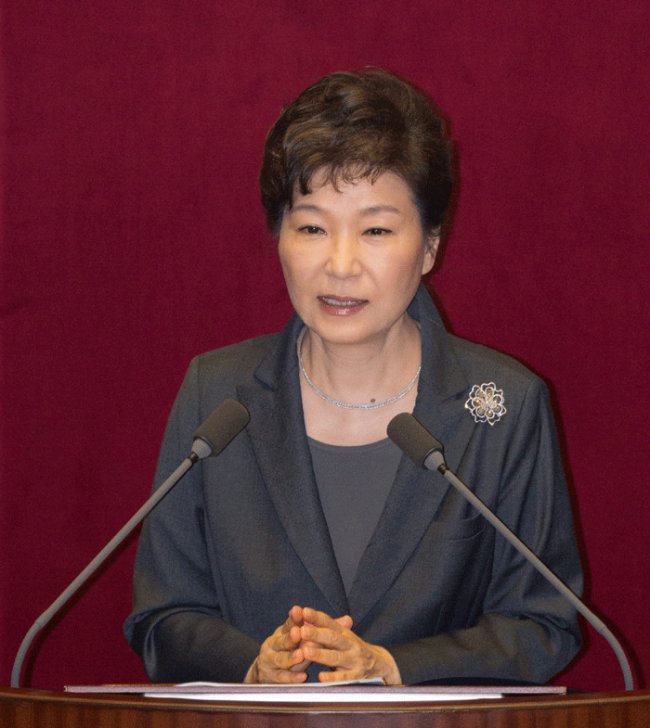Unrattled by the opposition lawmakers’ silent protest, President Park Geun-hye on Tuesday vowed to push ahead with a controversial plan to issue state-authored history textbooks, calling it a “righteous mission” to instill a sense of national pride for future generations.
While the opposition members sat with their laptops holding up signs denouncing her textbook plan, Park dismissed concerns that the plan was intended to glamorize pro-Japanese and pro-U.S. activities decades ago, stressing that she would not condone any distortion of history.
“Normalizing history education is a natural task and mission of our generation in order for the Republic of Korea’s future and to prepare for reunification, in order to have (our children) take leading roles with a firm view of the state in the midst of radically changing global affairs,” Park said in a determined voice.
 |
| President Park Geun-hye delivers her budget speech at National Assembly on Tuesday. (Yonhap) |
Park also urged lawmakers to end political confrontation over her plan to introduce the state-authored textbooks for secondary education and stop driving the nation into chaos.
“Distortion, confusion should be stopped for textbooks that have not been written yet — things that should not happen.
“Correcting the history should not be and cannot be the subject for political wrangling,” she said looking directly at opposition lawmakers who put up signs opposing her drive to publish history textbooks written by state-designated writers.
Opening the speech in a rather relaxed tone, Park touched widely on her achievements on state agenda on the economy, inter-Korean relations, labor and public services. The president, however, wrapped up her speech by raising her pitch on state-authored textbooks, a rare gesture seen as clarifying that she has no intention to call the plan off despite the intensifying ideological and political standoff.
 |
| The opposition members sit with their laptops holding up signs denouncing her textbook plan while Park delivers her speech. (Yonhap) |
In her 41-minute-speech, Park also urged lawmakers to ratify free trade deals that South Korea had concluded with China, New Zealand and Vietnam.
Stressing that the year 2016 was crucial to her government’s completion of a three-year economic innovation plan, the president also urged the parliament to approve bills designed to overhaul the nation’s labor sector and other economy-related bills within this year. She also urged lawmakers to pass the budget bill by the legal deadline of Nov. 30 to help her administration to effectively implement plans to revitalize the economy.
The president added that the government would set aside 14.8 trillion won ($13 billion) to strengthen measures for public safety. More than 30 percent of the 386 trillion won budget drafted for next year will be spent in the welfare sector.
On North Korea, Park pledged to strengthen defense readiness to better deal with Pyongyang’s possible provocations. Seoul will keep the door for dialogue open and continue efforts to promote exchanges of civilians, such as the reunions of separated families, she said.
The president also spent a large portion of her speech, stressing the need to secure stable jobs for young people. To open a bright future, South Korean should implement a series of radical reform measures to eradicate abnormal practices that remain hurdles for young people, she said.
“Bills aimed at revitalizing the economy and creating jobs for young people remain pending at the parliament for years. As president, it is regrettable.
“Even though it is a difficult task, we can only create good jobs for young Koreans only if we go through structural reform,” she said.
Her speech was delayed for 14 minutes as rival parties tussled over the main opposition New Politics Alliance for Democracy’s unexpected way of showing their opposition to Park. The NPAD lawmakers placed signs on the back of their laptops that read “No to state-authored textbooks” and “Stabilize people’s lives first.”
National Assembly Speaker Chung Ui-wha urged opposition lawmakers to remove the signs before Park enters the parliamentary chamber. The NPAD lawmakers, however, rejected Chung’s demand and sat on their hands throughout Park’s entire speech.
The ruling Saenuri Party chairman Kim Moo-sung hailed Park’s speech, saying that it would help the party set a new vision.
Expressing frustration, NPAD leader Rep. Moon Jae-in lashed out at Park that she had ignored the people’s demand to focus on the economy and withdraw her plan to introduce the textbooks.
“She gave no answer to questions on how to improve the people’s livelihood. There was no self-reflection at all on the government’s failed drive to revive the economy.”
Later in the afternoon, the NPAD held an outdoor rally at Seoul Plaza in association with progressive civic groups for first time in 14 months after the party launched a sit-in protest against the government’s botched rescue mission on Sewol ferry that sank off in April, last year. The opposition party also plans to hold a joint debate session with other minor progressive parties and a bus tour to expand public criticism on the textbook plan.
By Cho Chung-un (christory@heraldcorp.com)

